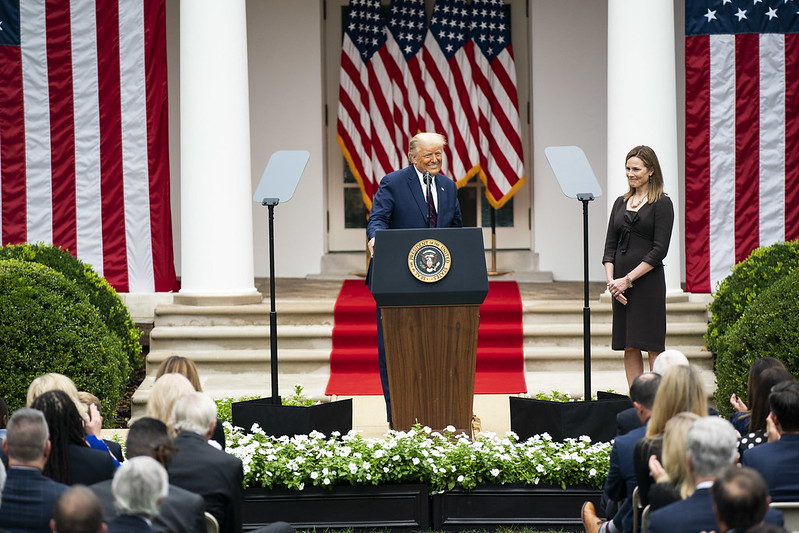Amy Coney Barrett’s arrival strips away even the pretense of neutrality or nonpartisanship.
The U.S. Supreme Court loses something it can hardly get back now that Amy Coney Barrett has been foisted upon it by President Donald Trump and Senate Republicans. It loses even the patina of neutrality that Chief Justice John Roberts has tried to cover it with ever since the Federalist Society, Donald Trump, and those same Republicans stole the seat left vacant by the death of Antonin Scalia. It loses even the appearance of propriety, and the presumption of good faith, that it has almost always had, even in other times where its ideology swung wildly out of proportion to the politics and priorities of the nation it purports to serve. It loses more of its credibility, if not whatever moral authority it had left, and becomes just another collection of political functionaries all vying to extend or retract the law as they see fit.
That’s a loss we all should mourn no matter who we are voting for this election season. It’s a loss our parents could not have fathomed. The court now is populated by three types of Republican appointees. There are two radicals, Justices Clarence Thomas and Samuel Alito, who must be cackling at the prospects of the gun rights they’ll now be able to recognize and the voting rights they’ll now be able to ignore. There are the two political functionaries, Justices Brett Kavanaugh and Barrett, who will be relentlessly tilting the scales of justice toward Republicans and against Democrats for the next half century. And there are the two “adults,” the Chief Justice and Justice Neil Gorsuch, neither of whom for all their courtesies will be remembered as moderate interpreters of law.
The ascension of Barrett means the court’s “center” moves now from Roberts to Gorsuch and that means it moves even more to the right. It means a court as far to the right as it has been in a century. This is what Sen. Mitch McConnell was crowing about Sunday, the skin on his hands as blackened as his soul, when he boasted about Barrett’s confirmation as a move his political adversaries won’t soon be able to overcome. The quiet parts aloud, right? McConnell knows, like the rest of us should, that Amy Coney Barrett wasn’t selected by Donald Trump to be an honest broker of the law.
And she won’t be. There is no reason—none—for anyone to think that Barrett is going to be a fair and neutral arbiter of the relentless political causes and cases she’ll face. There is no reason—none—for criminal defendants or immigration advocates or civil rights attorneys or those who believe in gun regulations or reproductive rights or the Affordable Care Act or stout First Amendment walls between church and state to believe they have a fair shot for her vote. This is so not just because Barrett wouldn’t have passed muster with the Federalist Society if she were wobbly about the far-right ideology she’s espoused all her professional life. It’s also so because of what Barrett said, and didn’t say, during her confirmation hearing.
By accepting the nomination in these dubious circumstances, Justice Barrett, too, loses something she can never replace. Not just her self-respect, which she relinquished minute-by-minute during her desultory confirmation hearing before the Senate Judiciary Committee. Not just her independence, which she waived Monday night by appearing with the president at the White House in what amounted to a campaign commercial for a beleaguered candidate. Sworn in by Justice Thomas, whose wife is a conservative activist, Barrett told the crowd of assembled Republicans that she would rule without fear or favor. She spoke these words after favoring her benefactor with her presence a week before Election Day.
She also spoke these words within an hour or so after the Court itself, in a dubious 5-3 ruling, sided with Wisconsin Republicans who had asked the justices to overturn a trial judge’s decision that extended the state’s deadline for receiving absentee ballots to six days after the ruling. This means, during a pandemic, that legitimate votes will not be counted, which is bad enough. What’s worse was the concurrence by Justice Kavanaugh, who indicated that he at least is amenable to having the court stop the counting of ballots on election night. Over and over again this election season, the court’s conservatives have sided with Republicans in election-related litigation. That imbalance will grow measurably worse with Barrett on board.
Barrett’s relentless willingness to serve as a prop for the Trump campaign– two COVID-19 super-spreader events in less than one month’s time– justifies the loss of respect the rest of us ought to have for her and the court itself. No matter how long she lasts on the court, and no matter how much the court’s makeup changes around her, she’ll always be recognized by half the country as an illegitimate justice, a judge whose confirmation was rushed through at the last minute by an unpopular president and a Senate majority on the verge of losing its lower. She should have just said no. At a minimum she should have at least said no to the rallies she attended both before and after her confirmation.
Barrett has no one but herself to blame for this sad reality. She could have changed the narrative of her own story earlier this month if she had told the Judiciary Committee, and the rest of the world, that she would recuse herself from any litigation that arises from the 2020 election. Litigation, in other words, that the president said publicly that he needed her to weigh in on, on the side of Republicans, when he nominated her. Any judge below the level of the Supreme Court would be required, by ethics if not by law, to immediately recuse in such circumstances (it’s always about the quid pro quo when it comes to Trump, isn’t it?). Any judge worthy of our respect as a Supreme Court justice would have said so during her confirmation hearing.
But Barrett said nothing– or at least nothing meaningful given the fact that she could well be the swing vote next week that hands the election to the man who just handed her a lifetime appointment to the nation’s highest court. Barrett pledged only to consider the question were it to come before her as a Justice. Perhaps she remembered how angry her benefactor got when Neil Gorsuch, in a similar situation three years ago, took a bolder stand on behalf of judicial independence. The president reportedly even considered rescinding Gorsuch’s nomination. Amy Coney Barrett, groomed for this starring role, would have none of that. So we got empty platitudes. That’s not my idea of an independent judge.
But Barrett doesn’t care what I think, or what you think, or what anyone else thinks beyond those who have helped her rocket to the high court at age 48. Her confirmation secure, she didn’t even try to lift her hearing above the soiled political farce it became. If she had been honorably nominated, and then honorably vetted by a Judiciary Committee, she likely would have received bipartisan support for her nomination despite her reactionary legal views. But clearly no one cares about such hollow courtesies now. Barrett sullies the court just as Trump has sullied her and she’ll sully American law in thousands of decisions from now until our grandchildren and great-grandchildren are picking up the pieces of our shabby work.
When I was just starting out in the law Justice Thurgood Marshall retired and was replaced by Clarence Thomas, a justice who has spent the past 29 years trying to undo Marshall’s work on the court. Now Amy Coney Barrett takes over for the late Justice Ruth Bader Ginsburg and gives every indication that she’s ready, willing, and able to spend the next 40 years undoing Ginsburg’s work. What a shame for all those who once saw the court as a bastion of light, not darkness. I keep hearing that Donald Trump ultimately ruins everything he touches. He and Mitch McConnell have now ruined the Supreme Court, too. That’s both an American tragedy and an open and obvious challenge to Senate Democrats if they win next week.
Andrew Cohen, a lawyer and journalist, is the Legal Affairs Correspondent for The Washington Spectator.







0 Comments